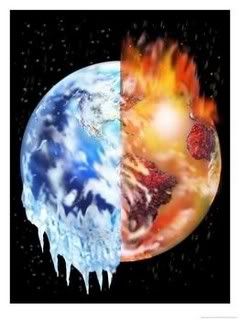Our Beautiful, Fragile Pale Blue Dot
Mankind's rarest view: Earth from afar
Space travelers recall what the planet looks like from above
 Anousheh Ansari / AP Iranian-American space tourist Anousheh Ansari took this photo looking down at Earth from the international space station in September 2006. |
When astronauts return from space, what they talk about isn’t the brute force of the rocket launch or the exhilaration of zero gravity. It’s the view.
And it’s mankind’s rarest view of all, Earth from afar.
Only two dozen men — those who journeyed to the moon — have seen the full Earth view.
Most space travelers, in low orbit, see only a piece of the planet — a lesser but still impressive glimpse. They have seen the curvature of Earth, its magnificent beauty, its fragility, and its lack of borders.
The first full view of Earth came from the moon-bound Apollo 8 during the waning days of a chaotic 1968. Apollo 8 astronaut Bill Anders put it in perspective in a documentary: “We came all this way to explore the moon, and the most important thing is that we discovered the Earth.”
Some of the photos Anders took were used on posters and pins on the first Earth Day in 1970. They’ve been “an environmental staple of Earth Days ever since,” said Denis Hayes, the first Earth Day coordinator.
For Earth Day this year — at a time when perhaps some perspective is needed — The Associated Press asked space travelers to recall what it’s like to see Earth from above:
“It was the only color we could see in the universe. ...
“We’re living on a tiny little dust mote in left field on a rather insignificant galaxy. And basically this is it for humans. It strikes me that it’s a shame that we’re squabbling over oil and borders.”
—Bill Anders, Apollo 8, whose photos of Earth became famous.
“It’s hard to appreciate the Earth when you’re down right upon it because it’s so huge.
“It gives you in an instant, just at a position 240,000 miles away from it, (an idea of) how insignificant we are, how fragile we are, and how fortunate we are to have a body that will allow us to enjoy the sky and the trees and the water ... It’s something that many people take for granted when they’re born and they grow up within the environment. But they don’t realize what they have. And I didn’t till I left it.”
—Jim Lovell, Apollo 8 and 13.
“The sheer beauty of it just brought tears to my eyes.
“If people can see Earth from up here, see it without those borders, see it without any differences in race or religion, they would have a completely different perspective. Because when you see it from that angle, you cannot think of your home or your country. All you can see is one Earth....”
—Anousheh Ansari, Iranian-American space tourist who flew last year to the international space station.
“Up in space when you see a sunset or sunrise, the light is coming to you from the sun through that little shell of the Earth’s atmosphere and back out to the spacecraft you’re in. The atmosphere acts like a prism. So for a short period of time you see not only the reds, oranges and yellows, the luminous quality like you see on Earth, but you see the whole spectrum red-orange-yellow-blue-green-indigo-violet.
“You come back impressed, once you’ve been up there, with how thin our little atmosphere is that supports all life here on Earth. So if we foul it up, there’s no coming back from something like that.”
—John Glenn, first American to orbit the Earth (1962) and former U.S. senator.
“I think you can’t go to space and not be changed, in many ways ....
“All of the teachings of the Bible that talk about the creator and his creation take on new meaning when you can view the details of the Earth from that perspective. So it didn’t change my faith per se, the content of it, but it just enhanced it, it made it even more real.”
—Jeff Williams, spent 6 months on the space station and set a record for most Earth photos taken.
“Earth has gone through great transitions and volcanic impacts and all sorts of traumatic things. But it has survived ... I’m not referring to human conflicts. I’m referring to the physical appearance of the Earth at a great distance. That it generally is mostly very peaceful (when) looked at from a distance.”
—Buzz Aldrin, second man to walk on the moon.
“I see the deep black of space and this just brilliantly gorgeous blue and white arc of the earth and totally unconsciously, not at all able to help myself, I said, ’Wow, look at that.”’
—Kathy Sullivan, first American woman to spacewalk, recalling what she said when she saw Earth in 1984.
“...From up there, it looks finite and it looks fragile and it really looks like just a tiny little place on which we live in a vast expanse of space. It gave me the feeling of really wanting us all to take care of the Earth. I got more of a sense of Earth as home, a place where we live. And of course you want to take care of your home. You want it clean. You want it safe.”
—Winston Scott, two-time shuttle astronaut who wrote a book, “Reflections From Earth Orbit.”
“You change because you see your life differently than when you live on the surface everyday. ... We are so involved in our own little lives and our own little concerns and problems. I don’t think the average person realizes the global environment that we really live in. I certainly am more aware of how fragile our Earth is, and, frankly, I think that I care more about our Earth because of the experiences I’ve had traveling in space.”
—Eileen Collins, first female space shuttle commander.
“You can see what a small little atmosphere is protecting us.
“You realize there’s not much protecting this planet particularly when you see the view from the side. That’s something I’d like to share with everybody so people would realize we need to protect it.”
—Sunita Williams, who has been living on the international space station since Dec. 11, 2006.
Click for related content |
“I left Earth three times. I found no place else to go. Please take care of Spaceship Earth.”
—Wally Schirra, who flew around Earth on Mercury, Gemini and Apollo missions in the 1960s.
AP writers Rasha Madkour in Houston, Mike Schneider in Cape Canaveral, Fla., and Alicia Chang in Los Angeles contributed to this report.
© 2007 The Associated Press.
>>>>>>>>>>>>>>>
WA:Did you look at the photos and slide show? Our incredibly beautiful home. Our home, the only one we have. For how long? As if the threat of global warming wasn't enough - whether by natural cycle or man made - we have an idiot of a president desperately eager to start a nuclear war and create Armegaddon. Iran may or may not have nuclear capability but many of our enemies either have it or have access to it. Does he think the US is invulnerable or impervious to nuclear retaliation? Does he think the world can stand a nuclear war?
We have several options; nuclear winter or nuclear holocaust: 
Global destruction and deaths on a unprecedented scale: 
America Burning.
COMMENTS:
The Future Was Yesterday said...
One of the reasons I still love to fly, even tho it's a nightmare anymore, is to get that sense of "being above it all." I think too many of us are guilty of thinking too small.I have tagged all three of you "Golden Girls", for "The Thinking Blogger's Award." If you wish to take part, please see this post to participate.
Thursday, April 26, 2007 8:50:00 PM
Granny said...
What a powerful post.I'm working on blog links for Thinking Bloggers. I'll be back.
Thursday, April 26, 2007 9:14:00 PM
Daniel said...
Most animals don't sh#t in their own nests. Humans do! I think there's a message in that for all of us.Namaste!
Thursday, April 26, 2007 9:46:00 PM
Kvatch said...
Years ago, just as the International Space Station project was getting under way, Boeing did a pair of television commericals that took a sort of nostalgic look at the space program. The first was about the drive to the first moon landing. Part of it was the music; part of it was the a line that said "We hoped, and we dreamed, and we looked up."The second contained quotes from astronauts, Americans and other nationalities, about how as they ascended the nations faded away until there was just the one globe.Your quotes remind me of that second commerical, but I can't ever remember seeing either without tearing up.
Sunday, April 29, 2007 9:52:00 AM
princesstea said...
on the subject of pale blue dots.this is an awesome little interpretationi found on youtube of carl sagans words.enjoy.andrea.xhttp://www.youtube.com/watch?v=47EBLD-ISyc
Monday, April 30, 2007 7:13:00 AM
David Cho said...
Beautiful indeed.
Tuesday, May 01, 2007 10:04:00 PM
Labels: Beautiful, Fragile Earth








6 Comments:
At Thursday, April 26, 2007 9:50:00 PM , The Future Was Yesterday said...
The Future Was Yesterday said...
One of the reasons I still love to fly, even tho it's a nightmare anymore, is to get that sense of "being above it all." I think too many of us are guilty of thinking too small.
I have tagged all three of you "Golden Girls", for "The Thinking Blogger's Award." If you wish to take part, please see this post to participate.
At Thursday, April 26, 2007 10:14:00 PM , Granny said...
Granny said...
What a powerful post.
I'm working on blog links for Thinking Bloggers. I'll be back.
At Thursday, April 26, 2007 10:46:00 PM , Daniel said...
Daniel said...
Most animals don't sh#t in their own nests. Humans do! I think there's a message in that for all of us.
Namaste!
At Sunday, April 29, 2007 10:52:00 AM , Anonymous said...
Anonymous said...
Years ago, just as the International Space Station project was getting under way, Boeing did a pair of television commericals that took a sort of nostalgic look at the space program. The first was about the drive to the first moon landing. Part of it was the music; part of it was the a line that said "We hoped, and we dreamed, and we looked up."
The second contained quotes from astronauts, Americans and other nationalities, about how as they ascended the nations faded away until there was just the one globe.
Your quotes remind me of that second commerical, but I can't ever remember seeing either without tearing up.
At Monday, April 30, 2007 8:13:00 AM , Anonymous said...
Anonymous said...
on the subject of pale blue dots.
this is an awesome little interpretation
i found on youtube of carl sagans words.
enjoy.
andrea.x
http://www.youtube.com/watch?v=47EBLD-ISyc
At Tuesday, May 01, 2007 11:04:00 PM , David Cho said...
David Cho said...
Beautiful indeed.
Post a Comment
Subscribe to Post Comments [Atom]
<< Home